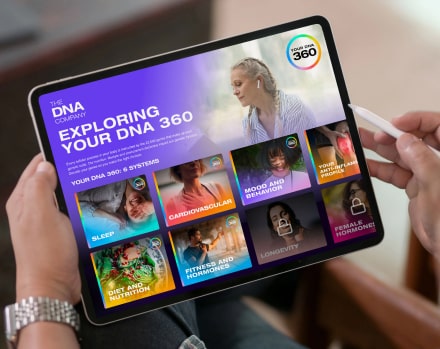DNA Research Says 10% of Adults Have "Super" Vision Less Likely to Decline with Age


How to improve your eyesight
What’s the main cause of poor eyesight? For most of us, it’s a combination of habits, risk factors, and - you guessed it - genetics.
This explains why some people grew up reading under the covers with a flashlight yet still have 20/20 vision, while others did everything within their power to protect their eyes but somehow ended up with glasses as thick as the bottom of a wine bottle.
According to new genetic research from the DNA Company, 10% of adults have “super” vision that is less likely to decline with age. The rest of us can expect to need glasses in midlife, even if we’ve escaped them up until then.
That’s not to say there’s nothing you can do to prevent your eyes from getting worse, however. Even if you lost the genetic lottery when it comes to eyesight, there are steps you can take to keep your eyes healthy and sharp.
The impact of TV on your eyesight
How much TV do you watch every day? Possibly more than you admit. After all, the average American watches more than 3 hours of TV per day. And yes, that includes streaming.
You may be concerned that watching TV will damage your eyesight. Fortunately, watching TV tends to have only short-term effects on your eyes. Of course, you may experience eye fatigue and discomfort after watching TV for a long period of time. This may be because you don’t blink as often while you watch TV.
When this happens, take a break from TV and rest your eyes for a little while. Make sure you get plenty of sleep so your eyes can recover.
If you often get headaches while watching TV, you may need to get your vision checked. Perhaps you’re squinting without realizing it in order to better see the screen.
Overall, you don’t need to worry about the long-term vision impact of watching too much TV. It’s more likely to negatively affect your sleep than your eyes, particularly if you have low BDNF levels. This is due to the harmful blue light emitted by the screen.
Blue light can mess up your circadian rhythm by tricking your body into thinking it’s daytime when it’s not. You can wear a pair of blue light blocking glasses to reduce the amount of blue light that reaches your eyes. And if you lucked out with “super” vision, you can just buy the kind without a prescription.

The gene behind “super” vision
It’s extremely common for your eyesight to worsen as you age. Then there are those people (few and far between) who seem to maintain perfect vision throughout their lives. They amount to about 10% of the population.
Those with “super” vision likely have the optimal version of the beta-carotene oxygenase 1 (BCMO1) gene. This gene determines your body’s ability to convert beta-carotene into retinol.
You may have never heard of beta-carotene or retinol, but you’re probably familiar with vitamin A (or at least you know it’s listed on your multivitamin bottle). Beta-carotene is the inactive form of vitamin A, while retinol is the activated form.
The activated form of vitamin A, retinol, is what strengthens your eyes and gives you better vision throughout your life. It may be surprising to learn that 90% of people struggle to convert beta-carotene into retinol. These are the people with the suboptimal version of the BCMO1 gene.
Now, vitamin A can come from either plant-based sources or animal sources. Plant-based sources give you beta-carotene, while animal sources provide retinol. If your body is unable to efficiently convert beta-carotene into retinol, you’d better get the majority of your vitamin A from animal sources such as fish, dairy products, eggs, and organ meats.
Aside from changing up your diet, there are other things you can do in order to improve your eyesight. In fact, you may want to follow these tips even if you have “super” vision.
How to improve your eyesight
Whether you wear glasses or not, there are some steps you can take to improve your eyesight (or at least stop it from getting worse). Here are some tips:
- Increase your blood circulation by exercising at least 20 minutes a day
- Make sure you have plenty of light while reading
- Take a break from looking at your computer screen at least once every 30 minutes
- Eat foods rich in vitamin C, vitamin E, zinc, and copper (and vitamin A, of course)
- Practice eye exercises such as circling your eyes in both directions and focusing on a pen at arm’s length
- Wear sunglasses to protect your eyes from the sun
- Get at least 8 hours of sleep every night
- Wash your hands before touching your eyes and store your contacts properly
Are you wondering whether you’re genetically predisposed to poor eyesight? The best way to find out is by decoding your genes through our 360 DNA Report. You’ll discover whether you have the suboptimal version of the BCMO1 gene as well as 37 other custom reports surrounding sleep, diet, nutrition, hormones, fitness, cardiovascular health, immunity, and behavior.
Each custom report includes your genetic tendencies as well as practical steps you can take to optimize your health and wellness. You are a unique individual, and you deserve health strategies that reflect your unique genome. Get started today.

Through a sample of your saliva, we are able to extract the DNA information we need to provide you with a customized DNA 360 Review.
SCAN YOUR DNA NOW












